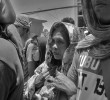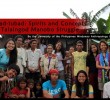The hegemonic spread of consumption patterns through globalization of the media and new information technologies does not only serve the interest of global capital at the expense of sustainable development, but also foster a growing objectification of women, their bodies and their sexuality.
By PROF. MAE FE ANCHETA-TEMPLA
My first wave of engagement with grassroots women while working with “high-heeled women” — a suggested category of women in professional circles — during the period, 1983 to 1988, allowed me to study the many dimensions of women’s lives. In 1986, a foreign missionary went to our office then at the Women Studies and Resource Center to ask me about women in prostitution in Davao City. It was a time for me to ponder on the economic woes presented by the women from the peasant, urban poor, and plantation workers’ communities in the social investigations that I and my colleagues initiated. There appeared a common thread and which continued to heighten as issues are linked to local and global events and circumstances.
The term is glaring: ‘globalization.’ It has become a by-word to many since the 1990s in describing the economic changes taking place worldwide. Promoters have propagated the belief that economies worldwide are becoming more integrated, and that prosperity would spread to all. But this has not been the case as proven by recent studies which showed that the globalization being pushed by international financial institutions such as the United States-led World Bank and International Monetary Fund, and by the World Trade Organization is significantly making more people in the Third World countries, among them the Philippines, succumb to poverty and neglect.
I found some meanings in Korten, in his well-argued book, When Corporations Rule The World (2001) where he boldly indicted corporate globalization as an unjust international economic order that colonizes all living things, earth’s spaces and resources all for the interest of the powerful corporations and financial institutions. The struggles of the people, their survival and resistance to a globalizing economy are concerns of half of the world’s population, specifically, women. Korten’s work and similar undertakings expose corporate globalization’s failure to improve the lives of the majority. Thus, it is imperative to see the larger context of the inequities people experience and crucial to understand their root causes.
The globalization process has weakened the effective decision-and-policy-making power of client states notably in economic and labor policies. Governments are unwilling to assert the rights of their workers since to do so would discourage investment. Consequences such as social exclusion, unemployment or low paid employment and weakening of trade union organizations have had gender (gendered) dimensions. It is of value until today to consider the Preliminary Report submitted by the Special Rapporteur on Violence against Women, Its Causes and Consequences,” economic systems which value profits often do so at the expense of female labor” (Chinkin, 2000).
I wish to share in this week-long commemoration of International Day of Action on Elimination of Violence Against Women Chinkin’s overview of women facing globalization: “The new globalized world is the result of processes relating to the restructuring of capital. It has changed the relationships between sexes, changed people’s opinions and values, and has reordered the political world landscape. This globalization process has evolved unequally across regions, socio-economic groups within regions, and between sexes, with multiple consequences that continue to erode the quality of people’s life. Women are not only affected as part of the family and as a disadvantaged group of society, but also as a result of their position in the sexual division of work.”
It has been noted that Third World women are the first to succumb to unemployment, low wages and displacement. But, more significantly, women are trapped into commodification. The hegemonic spread of consumption patterns through globalization of the media and new information technologies does not only serve the interest of global capital at the expense of sustainable development, but also foster a growing objectification of women, their bodies and their sexuality.
Filipino women, like other Third World women, have become more vulnerable than ever as they are forced or lured into the flesh trade. An unpublished article of Gabriela-Davao in 2004, reported that land and crop conversions in the countryside, particularly in Mindanao have pushed more young women to seek greener pastures in the towns and cities where they end up in sex trafficking and prostitution. This situation continues unabated with no action on the weaknesses of the existing agrarian law.
In addition, the tourism industry, touted by the government as a dollar earner, has, likewise, baited women into the flesh trade. With the Philippines being peddled as a tourism haven in Asia, tourism opens wide the floodgate to prostitution. This is boosted by the increasing number of travel agencies and pursued as a major component of the Brunei, Indonesia, Malaysia and Philippines (BIMP) and East Asia Growth Area (EAGA) plan in which the Philippines is part of. Reported cases handled by Talikala (a Davao City-based institution catering to the needs and rights of women in prostitution) serve as evidence to the fact that tourism networks are conduits of prostitution.
Clearly, the issues and problems faced by Filipino women and the rest of the women of Third World countries are but consequential in the era of globalization. Unless the poor and oppressed women of the world unite to struggle against imperialist globalization, women’s fate will remain as that of displaced, commodified and modern-day slaves.
The questions of gender, class and national oppression are essentially interlinked and interrelated to the globalized economy, thus, grassroots women need to unite for a stronger hold on the women’s movement. Filipino women in prostitution, aside from being survivors of other forms of abuses in the family, are confronted with further circumstances of victimization in the prevailing economic system. It is one where the economy is dependent on privatization, liberalization and deregulation prescribed by the forces behind corporate-driven globalization. Globalization as a consolidating system of capitalism breeds further commodification of women, specifically, on sexual services.
Prof. Mae Fe Ancheta-Templa is a women and children rights activist, social worker, peace advocate and chair of the Social Work Program of the Assumption College of Davao, Southern Philippines. Her fields of interest in research include gender, women, children, Moro and indigenous peoples, psychosocial help, community organization, indigenous social work and social administration. She was a research fellow at the University of Cape Town, South Africa.

![[STANDPOINT] Illegal drugs and the NIMBY mindset](https://davaotoday.com/wp-content/uploads/2016/09/Mags-Maglana_UPMIN-Sept.-20-110x100.jpg)








